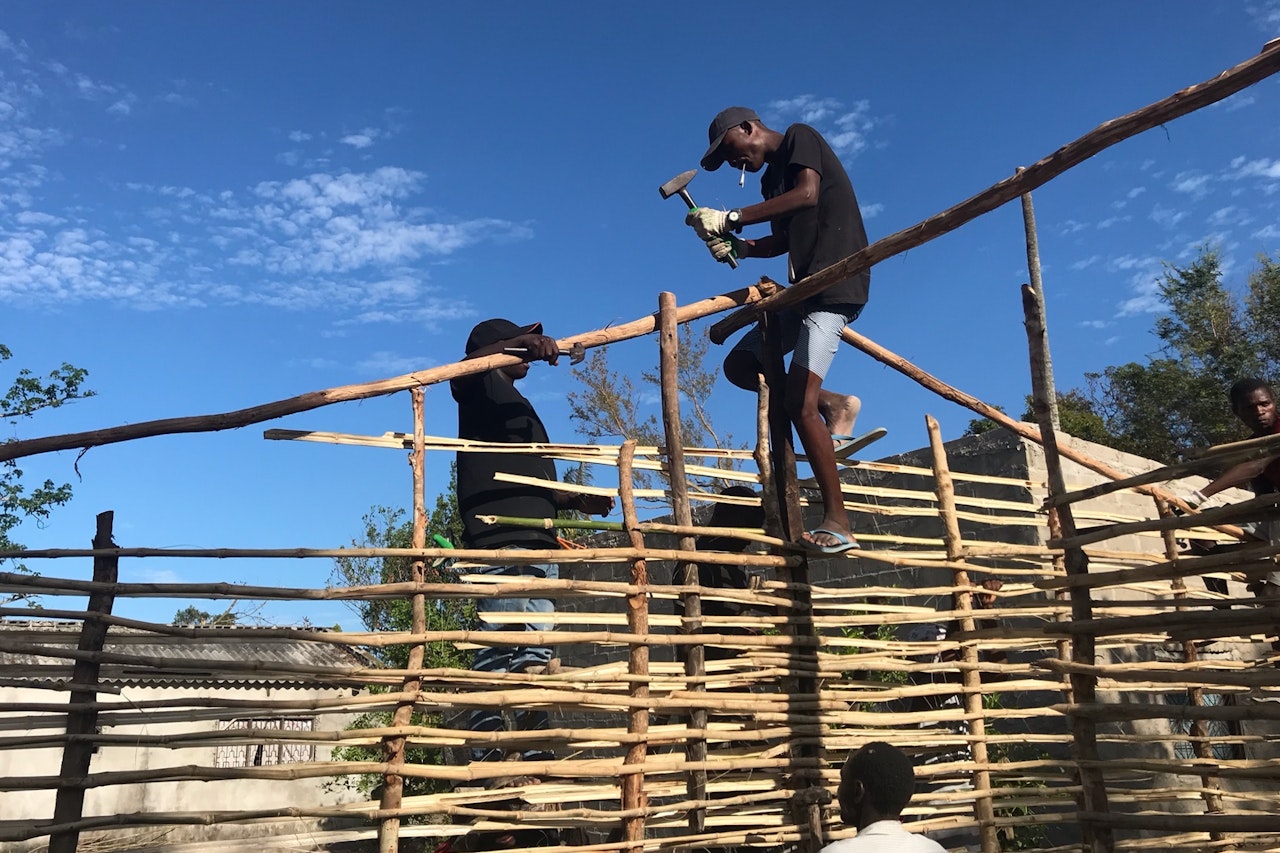In Mozambique, community mobilizes after cyclone
In the aftermath of Cyclone Idai, one of the worst ever recorded in the southern hemisphere, the Baha’is of Dondo are contributing to the recovery of their area.

In the aftermath of Cyclone Idai, one of the worst ever recorded in the southern hemisphere, the Baha’is of Dondo are contributing to the recovery of their area.

DONDO, Mozambique — Mud homes had melted, crops flooded, and electricity and phone connections were out. Cyclone Idai had devastated this largely rural region known as the Beira Corridor on 15 March.
After days of deluge, the Local Spiritual Assembly of Dondo gathered on the morning of 19 March to take stock of the community’s needs. Convening the meeting was a challenge; telephone lines were down, and the only way to reach each other was by going to each other’s homes.
The cyclone, one of the worst ever recorded in the southern hemisphere, first made landfall as it tore through the port city of Beira with sustained winds of 165 kilometers per hour. Idai made its way 30 kilometers inland to the town of Dondo and by nighttime was in Zimbabwe, weakened but still dumping torrential rain. After the cyclone dissipated, heavy rain continued for days, flooding the region’s waterways and turning them into an “inland ocean,” as described by a United Nations official. More than 1,000 people have died in the storm and its aftermath; thousands more remain displaced in Mozambique, Zimbabwe, and Malawi. Health officials are working to stem an outbreak of cholera, a disease transmitted through dirty water. As of Monday, 6,596 cholera cases and eight deaths have been reported, according to the United Nations Office for the Coordination of Humanitarian Affairs.
In Dondo, the Baha’i community relied on its experience organizing community-wide activities to contribute to the area’s recovery. Devotional gatherings and an emphasis on moral and spiritual education have fostered a sense of communal solidarity that extends beyond the interests of any one group to the whole community. Ultimately, a rising spirit of service has found expression in a growing desire to put others ahead of self and an emphasis on consultation and collective action.
In the immediate aftermath of the storm, before outside help could arrive, Dondo’s Assembly decided to take action. It identified two priorities: ensuring people had a roof over their heads and combatting price gouging.
“We realized we have a team of young people who can help,” explained Erick Mhiriri, a member of Dondo’s Assembly and the country’s National Spiritual Assembly.
Young adults participating in different educational activities have been helping to repair and rebuild homes damaged by the cyclone.
“They work together. They eat lunch together. They pray together,” Mr. Mhiriri said. “And after their work, they reflect and plan what they do the next day.”
So far, they have rebuilt three homes and repaired two. The young people continue to work on homes destroyed by the cyclone, now seeing this effort as a part of their service to the community, Mr. Mhiriri added.
Anticipating post-disaster price gouging, just after the storm, the Assembly of Dondo, drawing principally on its own resources, bought food and soap at lower wholesale prices and prepared small food kits for families in need. The Assembly carefully identified the most vulnerable families—typically those with young children or the elderly—and gave them about a week’s supply of food.
“People see that it is a privilege to be able to help others who lost more than we did,” said Arild Drivdal, the Secretary of Mozambique’s National Spiritual Assembly, who also visited Dondo shortly after the cyclone hit. “The Assembly of Dondo took on a strong role. They didn’t use a fixed formula. They assisted families on a case-by-case basis depending on their needs.”
The country’s National Spiritual Assembly received help from the worldwide Baha’i community, which provided financial and logistical assistance as well as guidance based on the lessons learned in this area of action by other communities that recovered from natural disasters.
With support from the Baha’i International Community, the prayers of Baha’is around the world, and the devoted efforts of the local population here, the people of Dondo are reminded of that fact that they are not alone. They are part of an interconnected global community contributing to the betterment of humanity, Mr. Mhiriri said.
A month after Idai, people in Dondo, an area that relies largely on communal farming, are resilient, carrying on with their daily responsibilities, according to Mr. Mhiriri. Yet, the community has to navigate dangers ahead, such as the spread of infectious diseases.
The government and aid agencies have also been responding to needs throughout Mozambique, including in Dondo. The United Nations allocated $20 million in emergency funds days after the cyclone hit, the Mozambique Red Cross and partners are distributing shelter kits to people in need, and international aid organizations have been vaccinating against and treating cholera in the weeks following the cyclone. The international humanitarian organization Doctors Without Borders reported on 15 April that cholera cases in Dondo are contained and being addressed, and the UN reports that the number of new reported cases continue to decline.